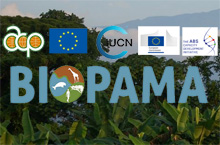Official Launch of Regional Observatory for Biodiversity and Protected Areas in Central Africa
 Brazzaville, Republic of Congo, 10 October 2014/ BIOPAMA/ IUCN/ ACP –The Biodiversity and Protected Areas Management Programme (BIOPAMA), will launch a regional Observatory for biodiversity and protected areas in Central Africa, with OFAC (Observatory for Central African Forests) as the host organisation.
Brazzaville, Republic of Congo, 10 October 2014/ BIOPAMA/ IUCN/ ACP –The Biodiversity and Protected Areas Management Programme (BIOPAMA), will launch a regional Observatory for biodiversity and protected areas in Central Africa, with OFAC (Observatory for Central African Forests) as the host organisation.
The BIOPAMA regional Observatory initiative in Central Africa aims to provide a better understanding of the trends and threats to protected areas in Central Africa in order to facilitate the relevant strategic, effective and timely responses. It is jointly implemented by the International Union for Conservation of Nature (IUCN), the European Commission's Joint Research Centre (JRC), the Observatory for Central African Forests (OFAC) and Protected Areas department of the DERE-UEMOA.
This Observatory will contribute significantly to collecting, treating and diffusing relevant information/data on protected areas in Central Africa and assist in making the decision-making process more effective.
The 14th meeting of the PFBC (Congo Basin Forest Partnership), which took place in Brazzaville, on 6 October, will be an opportunity to launch the Observatory for biodiversity and protected areas in Central Africa. This Observatory will be housed within OFAC (Observatory for Central African Forests) and implemented in partnership with RAPAC (the Central African Network of Protected Areas). This is why the Coordinator of the BIOPAMA Programme for Central and West Africa, Sébastien Regnaut, confirmed that: "…the PFBC meeting is the best occasion to host this event as it is the largest subregional conservation meeting. The PFBC meeting will be a sure way for institutional partners and stakeholders to best appropriate the challenges of this initiative".
The BIOPAMA programme aims to combat the threats to biodiversity in African, Caribbean and Pacific (ACP) countries, while reducing poverty in the neighbouring communities and the protected areas. BIOPAMA is an initiative of the ACP Secretariat financed by the 10th European Development Fund and implemented by the IUCN, JRC and the ABS Initiative.
This specifically entails the implementation of the BIOPAMA Observatory for the regions of Central and Western Africa and the development of the capacity-building strategy for decision-makers (data users) and to data providers.
"The African, Caribbean and Pacific Group of States has as one of its priorities the protection of biodiversity for the benefit of the lives and livelihoods of the millions of people in ACP States. It is for this reason that ACP countries have contributed 20 million under the 10th EDF for this very important project", said Mr. Achille Bassilekin, Assistant Secretary-General in charge of the Department of Sustainable Economic Development and Trade, of the ACP Group.
He reiterated the importance of the BIOPAMA programme by stating: "I also look forward to the launching of the remaining observatories in the other regions, which will be critical to determining the success of the BIOPAMA programme at the end of 2016".
For more information kindly contact Mr. Sébastien Regnaut, Regional Coordinator of the Protected Areas Programme in Central and West Africa (IUCN), Email: sebastien.regnaut@iucn.org; Tel.: (226) 50 49 82 34
About BIOPAMA
The Biodiversity and Protected Areas Management (BIOPAMA) programme aims to address threats to biodiversity in African, Caribbean and Pacific (ACP) countries, while reducing poverty in communities in and around protected areas. It is financially supported by resources from the intra-ACP envelope of the European Commission’s (EC) 10th European Development Fund (EDF). BIOPAMA combines improving data availability with capacity development to strengthen protected area management. It has two main components: one concerning protected areas, jointly implemented by the International Union for Conservation of Nature (IUCN) and the EC’s Joint Research Centre (JRC), and another, dealing with access and benefit sharing (ABS), implemented by the Multi-Donor ABS Capacity Development Initiative managed by Deutsche Gesellschaft für Internationale Zusammenarbeit (GIZ) GmbH. www.biopama.org
